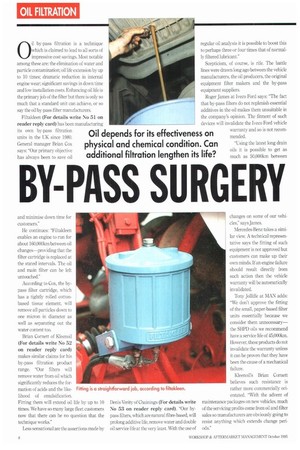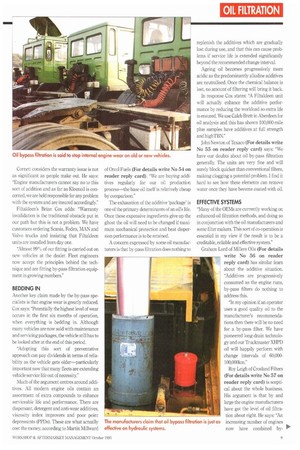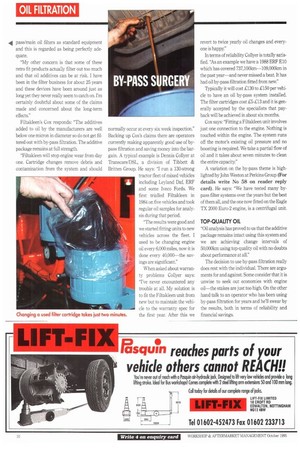BY-PASS SURGERY
Page 58

Page 59

Page 60

If you've noticed an error in this article please click here to report it so we can fix it.
Oil depends for its effectiveness on physical and chemical condition. Can additional filtration lengthen its life?
0 il by-pass filtration is a technique which is claimed to lead to all sorts of impressive cost savings. Most notable among these are: the elimination of water and particle contamination; oil life extension by up to 10 times; dramatic reduction in internal engine wear; significant savings in down time and low installation costs. Enhancing oil life is the primary job of the filter but there is only so much that a standard unit can achieve, or so say the oil by-pass filter manufacturers.
and minimise down time for customers."
He continues: "Filtakleen enables an engine to run for about 160,000km between oil changes—providing that the filter cartridge is replaced at the stated intervals. The oil and main filter can be left untouched."
According to Cox, the bypass filter cartridge, which has a tightly rolled cottonbased tissue element, will remove all particles down to one micron in diameter as well as separating out the water content too.
Brian Cornett of Kleenoil (For details write No 52 on reader reply card) makes similar claims for his by-pass filtration product range. Our filters will remove water from oil which significantly reduces the formation of acids and the likelihood of emulsification. Fitting them will extend oil life by up to 10 times. We have so many large fleet customers now that there can be no question that the technique works."
Less sensational are the assertions made by Denis Verity of Chainings (For details write No 53 on reader reply card). "Our bypass filters, which are natural fibre-based, will prolong additive life, remove water and double oil service life at the very least. With the use of regular oil analysis it is possible to boost this to perhaps three or four times that of normally filtered lubricant."
Scepticism, of course, is rife. The battle lines were drawn long ago between the vehicle manufacturers, the oil producers, the original equipment filter makers and the by-pass equipment suppliers.
Roger James at Iveco Ford says: "The fact that by-pass filters do not replenish essential additives in the oil makes them unsuitable in the company's opinion. The fitment of such devices will invalidate the Iveco Ford vehicle warranty and so is not recommended.
"Using the latest long drain oils it is possible to get as much as 50,000km between changes on some of our vehicles," saysJames.
Mercedes-Benz takes a similar view. A technical representative says the fitting of such equipment is not approved but customers can make up their own minds. If an engine failure should result directly from such action then the vehicle warranty will be automatically invalidated.
Tony Jolliffe at MAN adds: "We don't approve the fitting of the small, paper-based filter units essentially because we consider them unnecessary— the SHPD oils we recommend have a service life of 45,000km. However, these products do not invalidate the warranty unless it can be proven that they have been the cause of a mechanical failure.
Kleenoil's Brian Cornett believes such resistance is rather more commercially orientated. "With the advent of maintenance packages on new vehicles, much of the servicing profits come from oil and filter sales so manufacturers are obviously going to resist anything which extends change periods." Cornett considers the warranty issue is not as significant as people make out. He says: "Engine manufacturers cannot say no to this sort of addition and as far as Kleenoil is concerned, we are held responsible for any problem with the system and are insured accordingly."
Filtakleen's Brian Cox adds: "Warranty invalidation is the traditional obstacle put in our path but this is not a problem. We have customers ordering Scania, Foden, MAN and Volvo trucks and insisting that Filtakleen units are installed from day one.
"Almost 99% of our fitting is carried out on new vehicles at the dealer. Fleet engineers now accept the principles behind the technique and are fitting by-pass filtration equipment in growing numbers."
BEDDING IN Another key claim made by the by-pass specialists is that engine wear is greatly reduced. Cox says: "Potentially the highest level of wear occurs in the first six months of operation. when everything is bedding in. Although many vehicles are now sold with maintenance and servicing packages, the vehicle still has to be looked after at the end of this period.
"Adopting this sort of preventative approach can pay dividends in terms of reliability as the vehicle gets older—particularly important now that many fleets are extending vehicle service life out of necessity."
Much of the argument centres around additives. All modern engine oils contain an assortment of extra compounds to enhance serviceable life and performance. There are dispersant, detergent and anti-wear additives, viscosity index improvers and poor point depressants (PPDs). These are what actually cost the money, according to Martin Millwarci of Orcol Fuels (For details write No 54011 reader reply card). "We are buying additives regularly for our oil production process—the base oil itself is relatively cheap by comparison."
The exhaustion of the additive 'package' is one of the primary determinants of an oil's life. Once these expensive ingredients give up the ghost the oil will need to be changed if maximum mechanical protection and heat dispersion performance is to be retained.
A concern expressed by some oil manufacturers is that by-pass filtration does nothing to replenish the additives which are gradually lost during use, and that this can cause problems if service life is extended significantly beyond the recommended change interval.
Ageing oil becomes progressively more acidic as the predominantly alkaline additives are neutralised. Once the chemical balance is lost, no amount of filtering will bring it back.
In response Cox states: "A Filtakleen unit will actually enhance the additive performance by reducing the workload so extra life is ensured. We use Caleb Brett in Aberdeen for oil analysis and this has shown 100,000-mile plus samples have additives at full strength and highTBN."
John Newton of Texaco (For details write No 55 on reader reply card) says: "We have our doubts about oil by-pass filtration generally. The units are very fine and will surely block quicker than conventional filters, making clogging a potential problem. I find it hard to see how these elements can remove water once they have become coated with oil.
EFFECTIVE SYSTEMS "Many of the OEMs are currently working on enhanced oil filtration methods, and doing so in conjunction with the oil manufacturers and some filter makers. This sort of co-operation is essential in my view if the result is to be a creditable, reliable and effective system."
Graham Lord of Millers Oils (For details write No 56 on reader reply card) has similar fears about the additive situation. "Additives are progressively consumed as the engine runs, by-pass filters do nothing to address this.
"In my opinion if an operator uses a good quality oil to the manufacturer's recommendations then there will be no need for a by-pass filter. We have pioneered long-drain technology and our Truckmaster XHPD oil will happily perform with change intervals of 60,000. 100,000km."
Roy Leigh of Crosland Filters (For details write No 57 on reader reply card) is sceptical about the whole business. His argument is that by and large the engine manufacturers have got the level of oil filtration about right. He says: "An increasing number of engines now have combined by 40 pass/main oil filters as standard equipment and this is regarded as being perfectly adequate.
"My other concern is that some of these retro fit products actually filter out too much and that oil additives can be at risk. I have been in the filter business for about 25 years and these devices have been around just as long yet they never really seem to catch on. I'm certainly doubtful about some of the claims made and concerned about the long-term effects."
Filtakleen's Cox responds: "The additives added to oil by the manufacturers are well below one micron in diameter so do not get filtered out with by-pass filtration. The additive package remains at full strength.
"Filtakleen will stop engine wear from day one. Cartridge changes remove debris and contamination from the system and should normally occur at every six week inspection." Backing up Cox's claims there are operators currently making apparently good use of bypass filtration and saving money into the bargain. A typical example is Dennis Collyer at Transcare/DSL, a division of Tibbett & Britten Group. He says: "I run a 130-strong tractor fleet of mixed vehicles including Leyland Daf, ERF and some Iveco Fords. We first trialled Filtakleen in 1984 on five vehicles and took regular oil samples for analysis during that period.
"The results were good and we started fitting units to new vehicles across the fleet. I used to be changing engine oil every 6,000 miles, now it is done every 40,000—the savings are significant."
When asked about warranty problems Collyer says: "I've never encountered any trouble at all. My solution is to fit the Filtakleen unit from new but to maintain the vehicle to the warranty spec for the first year. After this we revert to twice yearly oil changes and everyone is happy."
In terms of reliability Collyer is totally satisfied. "As an example we have a 1988 ERF El0 which has covered 737,100km-109,000km in the past year—and never missed a beat. It has had oil by-pass filtration fitted from new" Typically it will cost £130 to £150 per vehicle to have an oil by-pass system installed. The filter cartridges cost L5-,C13 and it is generally accepted by the specialists that payback will be achieved in about six months.
Cox says: "Fitting a Filtakleen unit involves just one connection to the engine. Nothing is touched within the engine. The system runs off the motor's existing oil pressure and no boosting is required. We take a partial flow of oil and it takes about seven minutes to clean the entire capacity:" A variation on the by-pass theme is highlighted by John Weston at Perkins Group (For details write No 58 on reader reply card). He says: "We have tested many bypass filter systems over the years but the best of them all, and the one now fitted on the Eagle TX 2000 Euro-2 engine, is a centrifugal unit.
TOP-QUALITY OIL "Oil analysis has proved to us that the additive package remains intact using this system and we are achieving change intervals of 50,000km using top-quality oil with no doubts about performance at all."
The decision to use by-pass filtration really does rest with the individual. There are arguments for and against. Some consider that it is unwise to seek out economies with engine oil—the stakes are just too high. On the other hand talk to an operator who has been using by-pass filtration for years and he'll swear by the results, both in terms of reliability and financial savings.




































































































































